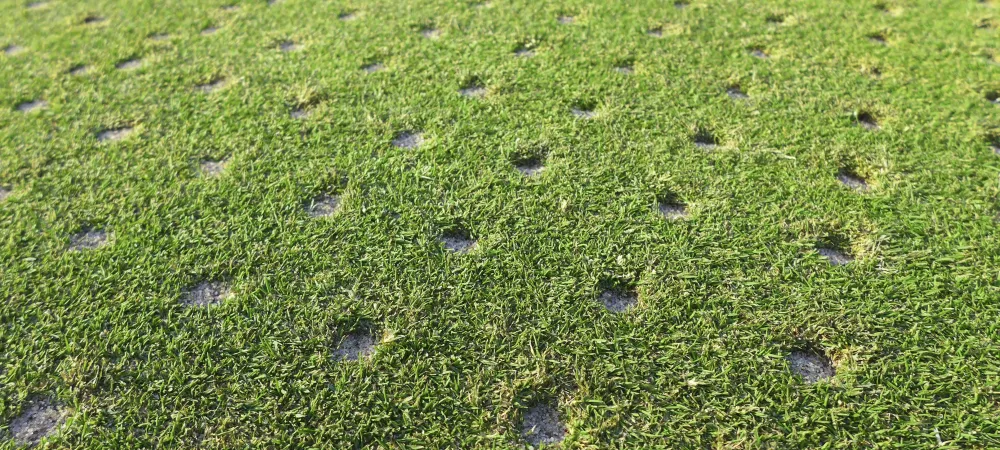10 Signs It’s Time To Aerate & Seed Your Lawn

The best way to keep your lawn looking its best is by aerating and seeding it every year. Many people wait until their lawn is in bad shape before they take action, but this can often lead to extensive damage. If you're not sure whether or not it's time for you to aerate and seed your lawn, then read on!
10 Signs Your Lawn Needs Aeration:
- When Should You Aerate Your Lawn
- There's Thatch
- Heavy Foot Traffic Areas
- You Have Clay Soil
- Puddles On Your Lawn
- Thinning Grass
- Discolored Areas
- Inability to Moisten
- Grass Stops Growing
- Failed The Screwdriver Test
Signs You Need To Aerate Your Lawn
A vibrant green lawn is the perfect backdrop for outdoor activities. Unfortunately, the scorching temperatures and soil compaction can cause your grass to die. Aeration and seeding act as a renewal process that will help rejuvenate your lawn. Here are some signs you should aerate your lawn:
When Should You Aerate Your Lawn
The fall is the best time to aerate and seed your yard. Aeration during the fall season will assist in nutrients to reach the root system. The cooler temperatures and moist soil help the new grass seed germinate quickly.
There's Thatch
Thatch is a layer of dead organic matter that accumulates on top of your lawn. A thatch layer thicker than ½ inch can prevent water, oxygen, and nutrients from reaching your lawn’s root system. Aeration helps to decompose thatch at a faster rate.
Heavy Foot Traffic Areas
If you have heavy foot traffic, kids, or pets who play on your lawn regularly, this can cause compacted soil. Aerating will help loosen up the soil so that new grass can grow.
You Have Clay Soil
Many homes, especially new construction, are built on clay soil. Clay soil is dense and doesn’t allow air, water, or nutrients to move freely through the soil. This can lead to an unhealthy lawn. Aerating your lawn will help break up the clay and improve drainage.
Puddles on Your Lawn
Do you have puddles forming on your lawn after a light rain? Poor drainage is another sign that your lawn needs to be aerated. Aeration will help improve the drainage of your lawn and reduce puddling.
Thinning Grass
There are many reasons why your grass might be thinning. One reason could be that your lawn is too compacted for the roots to grow properly. Aeration will help reduce compaction and improve the health of your lawn.
Discolored Areas
Yellow and brown spots in your lawn are usually a sign that the grassroots do not have the proper nutrients it needs to thrive and be green. If you notice other warning signs combined with yellow or brown areas, it’s time to aerate and seed.
Inability to Moisten
There’s a difference between saturated ground and compacted soil not allowing proper absorption; however, both look similar if you aren’t paying close attention. When the ground is saturated, it will remain wet for a while. However, if an area is suffering from compacted soil, then it may appear wet but quickly dry out afterward. Essentially, you aren’t able to keep compacted soil moist.
Grass Stops Growing
It should be no surprise that grass needs food to grow. Fertilizer provides essential nutrients for a healthy lawn; however, over time, that same fertilizer will compact the soil and make it difficult for new blades of grass to break through. If you notice your grass has stopped growing or growing at a very slow pace, it may be time to aerate.
Failed the Screwdriver Test
Using a screwdriver or even a pencil, you can test to see if the soil is compacted. Stick the object into the ground and see if you have difficulty. If you do, it's time to call the experts in.
Does My Lawn Need Aeration
If your lawn is compacted, has a heavy thatch layer, or experiences drainage problems, aeration may be necessary. Aeration alleviates compaction by reducing soil density. This allows air, water, and nutrients to easily reach the grassroots.
How To Aerate Your Lawn
Aerating involves making small holes in the soil so that air can reach the roots of the grass. This helps the grass to grow more vigorously and also helps to prevent problems such as compaction and thatch build-up.
There are two main ways to aerate your lawn: either with a manual or powered aerator.
- Manual aerators are basically garden forks with prongs that you push into the ground to make holes.
- Powered aerators have either spikes or blades that rotate, making it easier to penetrate the soil.
If you're unsure how to aerate your lawn, contact the professionals at The Green Team. Our lawn care experts will be happy to help you achieve a healthy lawn with our lawn aeration services!

